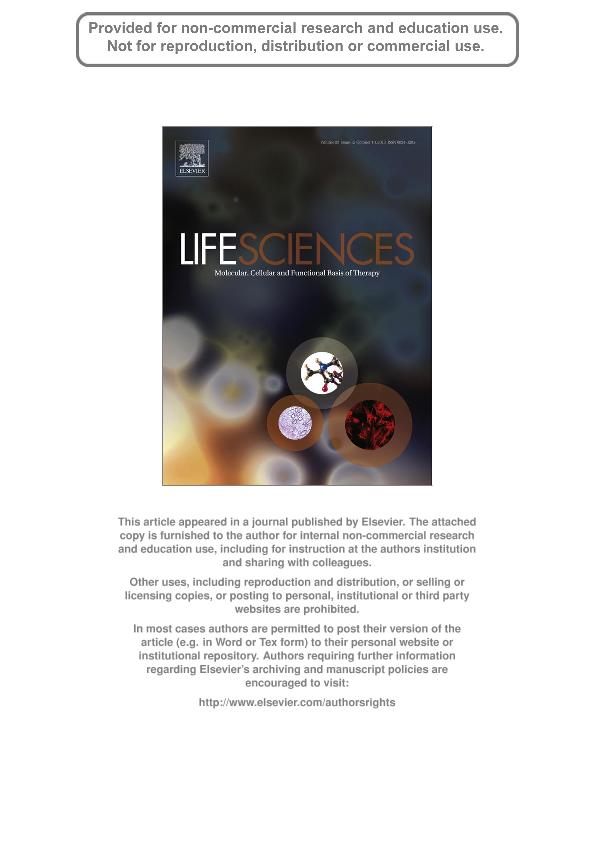Mostrar el registro sencillo del ítem
dc.contributor.author
Karbiner, María Sofía

dc.contributor.author
Sierra, Liliana
dc.contributor.author
Minahk, Carlos Javier

dc.contributor.author
Fonio, Maria Cristina
dc.contributor.author
Peral, Maria de Los Angeles

dc.contributor.author
Jerez, Susana Josefina

dc.date.available
2017-08-08T15:16:31Z
dc.date.issued
2013-08
dc.identifier.citation
Karbiner, María Sofía; Sierra, Liliana; Minahk, Carlos Javier; Fonio, Maria Cristina; Peral, Maria de Los Angeles; et al.; The role of oxidative stress in alterations of hematological parameters and inflammatory markers induced by early hypercholesterolemia; Elsevier Inc; Life Sciences; 93; 15; 8-2013; 503-508
dc.identifier.issn
0024-3205
dc.identifier.uri
http://hdl.handle.net/11336/22019
dc.description.abstract
Aims: The investigation of the effects of a high cholesterol diet (HD) for a short-time period on hematological parameters and the potential role of oxidative stress and inflammation markers. Main methods: Rabbits were fed either a control diet or a diet containing 1% cholesterol (HD) for 5–6 weeks. The plasma lipid levels, C reactive protein (CRP), total red blood cells (RBC), total white blood cells (WBC), platelet count, packed cell volume (PCV) and leukocyte formula were determined. Oxidative stress was evaluated by the thiobarbituric acid reactive substances (TBARS), total glutathione and GSH serum level measurements. The osmotic fragility and the membrane fluidity of erythrocytes were determined. The levels of total cholesterol and TBARS were also measured in the erythrocyte membrane suspension. Key findings: A decrease in the RBC and PCV was observed in rabbits fed on HD. The membrane rigidity and osmotic fragility were increased, and the morphological changes caused by the HD and TBARS levels in the erythrocyte membrane may account for this phenomenon. The inflammatory markers as the CRP levels, the platelet count, the WBC and the neutrophils were increased. The TBARS and GSH levels in the serum were increased and decreased, respectively. Significance: This study shows that feeding rabbits an HD for a short time induces hematological alterations, disturbances in the oxidant–antioxidant balance and an increase of inflammatory markers. These findings support the importance of the early correction or prevention of high cholesterol levels to disrupt the process leading to the development of cardiovascular diseases.
dc.format
application/pdf
dc.language.iso
eng
dc.publisher
Elsevier Inc

dc.rights
info:eu-repo/semantics/openAccess
dc.rights.uri
https://creativecommons.org/licenses/by-nc-nd/2.5/ar/
dc.subject
Stress Oxidativo
dc.subject
Hematologia
dc.subject
Conejos
dc.subject
Hipercolesterolemia
dc.subject.classification
Bioquímica y Biología Molecular

dc.subject.classification
Medicina Básica

dc.subject.classification
CIENCIAS MÉDICAS Y DE LA SALUD

dc.title
The role of oxidative stress in alterations of hematological parameters and inflammatory markers induced by early hypercholesterolemia
dc.type
info:eu-repo/semantics/article
dc.type
info:ar-repo/semantics/artículo
dc.type
info:eu-repo/semantics/publishedVersion
dc.date.updated
2017-08-07T17:37:49Z
dc.journal.volume
93
dc.journal.number
15
dc.journal.pagination
503-508
dc.journal.pais
Estados Unidos

dc.journal.ciudad
Nueva York
dc.description.fil
Fil: Karbiner, María Sofía. Consejo Nacional de Investigaciones Científicas y Técnicas. Centro Científico Tecnológico Conicet - Tucuman. Instituto Superior de Investigaciones Biológicas. Universidad Nacional de Tucuman. Instituto Superior de Investigaciones Biologicas; Argentina
dc.description.fil
Fil: Sierra, Liliana. Consejo Nacional de Investigaciones Científicas y Técnicas. Centro Científico Tecnológico Conicet - Tucuman. Instituto Superior de Investigaciones Biológicas. Universidad Nacional de Tucuman. Instituto Superior de Investigaciones Biologicas; Argentina
dc.description.fil
Fil: Minahk, Carlos Javier. Consejo Nacional de Investigaciones Científicas y Técnicas. Centro Científico Tecnológico Conicet - Tucuman. Instituto Superior de Investigaciones Biológicas. Universidad Nacional de Tucuman. Instituto Superior de Investigaciones Biologicas; Argentina
dc.description.fil
Fil: Fonio, Maria Cristina. Universidad Nacional de Tucumán. Facultad de Bioquímica, Química y Farmacia. Instituto de Bioquímica Aplicada; Argentina
dc.description.fil
Fil: Peral, Maria de Los Angeles. Consejo Nacional de Investigaciones Científicas y Técnicas. Centro Científico Tecnológico Conicet - Tucuman. Instituto Superior de Investigaciones Biológicas. Universidad Nacional de Tucuman. Instituto Superior de Investigaciones Biologicas; Argentina
dc.description.fil
Fil: Jerez, Susana Josefina. Consejo Nacional de Investigaciones Científicas y Técnicas. Centro Científico Tecnológico Conicet - Tucuman. Instituto Superior de Investigaciones Biológicas. Universidad Nacional de Tucuman. Instituto Superior de Investigaciones Biologicas; Argentina
dc.journal.title
Life Sciences

dc.relation.alternativeid
info:eu-repo/semantics/altIdentifier/doi/http://dx.doi.org/10.1016/j.lfs.2013.08.003
dc.relation.alternativeid
info:eu-repo/semantics/altIdentifier/url/http://www.sciencedirect.com/science/article/pii/S002432051300458X
Archivos asociados
